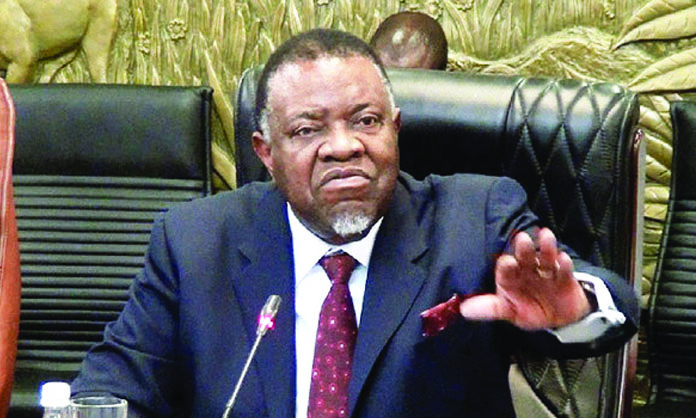President Hage Geingob has denounced ongoing succession fights among traditional leaders, saying this drains the government’s resources.
Geingob was speaking at the opening of the 24th annual meeting of the Council of Traditional Leaders at Swakopmund yesterday.
The president said traditional leaders must address their differences.
“As a government, we are concerned about the mushrooming of traditional authorities, and leadership succession battles and disputes among traditional authorities,” Geingob said.
He said such disputes not only cause community division, but also consume the government’s resources and time.
Minister of urban and rural development Erastus Uutoni emphasised the integral role of traditional authorities within the country’s governance structure.
He said the surge in applications for the recognition of new traditional authorities is concerning.
“The ministry is flooded with new applications for recognition to an extent that every community seeks recognition, including those who fall under already recognised traditional authorities,” Uutoni said.
The minister also called for clarity on customary laws of succession to avoid disputes.
Uutoni said there was a need to revisit the provisions of Section 5 of the Traditional Authorities Act on the designation of chiefs or heads of traditional communities.
He said addressing succession disputes within traditional authorities is best managed by the authorities themselves, but that his office’s attempts to intervene in these disputes are often unsuccessful due to a lack of cooperation from community members and a waste of public resources.
The minister urged the meeting’s participants to focus on resolving disputes through a blend of traditional practices, existing laws and African dialogue.
He said terms like ‘king’ and ‘queen’ are inconsistent with Namibia’s Constitution.
He recommended using traditional titles, even in English, to maintain integrity.
The chairperson of the Council of Traditional Leaders, Immanuel /Gaseb, emphasised the council’s commitment to resolving legal matters.
“We . . . will revise strategies on how better to overcome such challenges,” he said, expressing gratitude for the government striking some legal challenges from the court roll.
/Gaseb urged respect for customary laws to resolve succession disputes within traditional communities, highlighting the detrimental impact of such disputes on leaders.
“It is best that these disputes are resolved through customary law,” he said.
Geingob urged traditional authorities to confront practices which are detrimental to societal progress, such as inheritance practices, child marriage and child labour.
“Do not allow, within your respective jurisdictions, the archaic cultural practices of child marriage and child labour which enslave our children to lifelong servitude,” he said.
In discussing socio-economic issues, Geingob acknowledged Namibia’s challenges with inequality and poverty.
He pointed to the social protection policy launched in March last year, and noted the increase in the old-age grant from N$600 in 2015 to N$1 400 currently.
“This grant has a proven overall positive impact on stemming child poverty among poorer families across our country,” he said.
Geingob reminded authorities that while Namibians have the right to practise their cultural beliefs, these practices must align with the Namibian Constitution and national objectives.
/Gaseb praised the president’s favourable approach to traditional authorities, and acknowledged his role in designating chiefs and providing support in these areas.
He encouraged community participation in agricultural initiatives to address poverty.



Leave a Reply